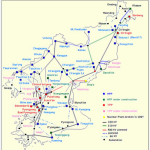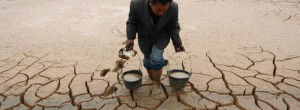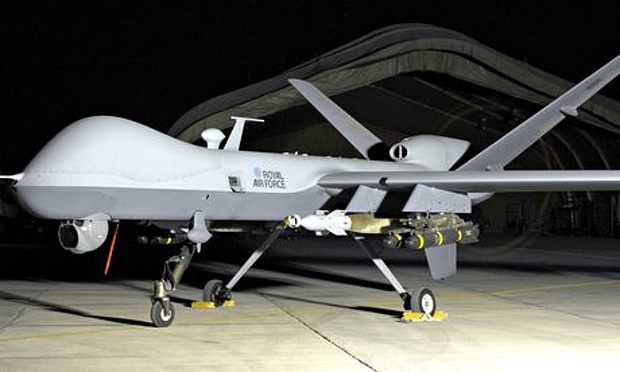- DETERRENCE: Obama to host Washington summit on nuclear proliferation
- DPRK: Reforming North Korea: Law, politics, and the market economy
- GOVERNANCE AND CIVIL SOCIETY: Can South Korea lead nuclear cooperation in northeast Asia?
- CLIMATE CHANGE ADAPTATION: The nexus approach to water-energy-food security
- AUSTRAL PEACE AND SECURITY: UK drone strike in Syria: Bombing for past crimes reeks of extrajudicial punishment
 DETERRENCE: Obama to host Washington summit on nuclear proliferation, Carol Lee, Wall St. Journal, (10 August 2015)
DETERRENCE: Obama to host Washington summit on nuclear proliferation, Carol Lee, Wall St. Journal, (10 August 2015)
The 2016 Nuclear Security Summit will focus on ways to “minimize the use of highly enriched uranium, secure vulnerable materials, counter nuclear smuggling, and deter, detect and disrupt attempts at nuclear terrorism.” Will nuclear security standards in a multilateral framework be proposed?
- Combating nuclear smuggling, DHS research and development on radiation detection technology could be strengthened, GAO-15-263 (March 2015)
- Organic crystals: Stilbene crystals improve neutron detection, Gail Overtone, LaserFocusWorld (11 June 2012)
- Breakthrough detection technologies, Domestic Nuclear Detection Office (17 July 2015)
 DPRK: Reforming North Korea: Law, politics, and the market economy, Darren C. Zook, Stanford Journal of International Law (2012) [PDF, 4MB]
DPRK: Reforming North Korea: Law, politics, and the market economy, Darren C. Zook, Stanford Journal of International Law (2012) [PDF, 4MB]
North Korea’s Special Economic Zones and economy writ large have several structural inconsistencies including legal, energy and political issues. While North Korea appears to tinker with its legal and financial structures on the margins, there appear to be a great number of supra-legal actions which negatively impact the way present and future investors view the legal environment. The energy situation remains dire and there is no clear champion in North Korea for economic reform. All those conditions can be changed with political will.
- Reconstituting China-DPRK investment ties, Marcus Noland, North Korea: Witness to Transformation blog (26 August 2015)
- Fruit crop insurance to be introduced in the future, (North) Korea Insurance Corporation (undated)
- Supplying energy needs for the DPRK’s Special Economic Zones and Special Administrative Regions: Electricity infrastructure requirements, Roger Cavazos and David Von Hippel, Nautilus Institute for Security and Sustainability (19 August 2014)
 GOVERNANCE AND CIVIL SOCIETY: Can South Korea lead nuclear cooperation in northeast Asia? Prashanth Parameswaran, The Diplomat (26 August 2015)
GOVERNANCE AND CIVIL SOCIETY: Can South Korea lead nuclear cooperation in northeast Asia? Prashanth Parameswaran, The Diplomat (26 August 2015)
Despite efforts by Seoul to assert itself as more than a ‘shrimp among whales’, it seems unlikely that it will be able to lead cooperation on nuclear issues in the region in light of regional politics and lack of trust among the ROK, China, Japan and the DPRK. Japan could be another leader, although its dependence on the US’s nuclear umbrella hinder its credibility. Perhaps Beijing is in the strongest position to take the reins.
- Can Japan become a bridge-builder for nuclear disarmament? Masako Toki, Bulletin of the Atomic Scientists (19 August 2015)
- Link nuclear disarmament and non-proliferation efforts, Ramesh Thakur, Japan Times (11 August 2015)
 CLIMATE CHANGE ADAPTATION: The nexus approach to water-energy-food security: An option for adaptation to climate change, Golam Rasul & Bikash Sharma, Climate Policy, Taylor & Francis (2015) [Open Access]
CLIMATE CHANGE ADAPTATION: The nexus approach to water-energy-food security: An option for adaptation to climate change, Golam Rasul & Bikash Sharma, Climate Policy, Taylor & Francis (2015) [Open Access]
Although interest in adaptation to climate change impacts has surged in recent years, the focus has remained sectoral. The role of the water–food–energy nexus in addressing the competing demands of – and facilitating – adaptation and development has not yet been fully recognized. Historically, most adaptation plans, including the National Adaptation Programmes of Action (NAPAs), have been prepared to meet sectoral goals. They generally focus on sectoral and project-based activities, without adequate consideration or coordination of cross-sectoral interactions among key climate-sensitive sectors such as water, energy, and food.
- Climate change, the food energy water nexus and food security in South Africa: Understanding the food energy water nexus, Suzanne Carter and Manisha Gulati, WWF-South Africa (2014) [360 KB, PDF]
- Climate change and challenges of water and food security, Anil Kumar Misra, International Journal of Sustainable Built Environment, vol. 3, issue 1, pp. 153-165 (June 2014) [Open Access]
 AUSTRAL PEACE AND SECURITY: UK drone strike in Syria: Bombing for past crimes reeks of extrajudicial punishment, Ben Saul, The Interpreter (15 September 2015)
AUSTRAL PEACE AND SECURITY: UK drone strike in Syria: Bombing for past crimes reeks of extrajudicial punishment, Ben Saul, The Interpreter (15 September 2015)
New PM or not, strategic purpose or not, Australia is extending its Iraq bombing mission into Syria as ‘collective defence of Iraq’. And UK has joined the US in drone assassinations of its own citizens in countries with which it is not at war. Both the doctrine and the practice will become unwelcome blowback when adopted by other countries. Meanwhile Australian military personnel are training on MQ-9 Reaper armed drones in the US, as Australia is building a ground station for the WGS ‘big pipe’ COMSATs the Reapers need.
- Australian troops will get better real-time battlefield communications information through enhanced access to a high-tech US military satellite system, John Kerin, Australian Financial Review (15 September 2015
- Bombing raids in Syria would be illegal and disastrous, former ADF General Peter Gration warns, David Mark, The World Today, ABC News (4 September 2015)
- Australia says military is training with U.S. Reaper drones, Rob Taylor, Wall Street Journal (23 February 2015)
The Nautilus Peace and Security Weekly Report presents articles and full length reports each week in six categories: Austral security, nuclear deterrence, energy security, climate change and security, the DPRK, climate change adaptation and governance and civil society. Our team of contributors carefully select items that highlight the links between these themes and the three regions in which our offices are found — North America, Northeast Asia, and the Austral-Asia region.
Subscribe to NAPSNet to receive free weekly email reports.
- Editor: Arabella Imhoff
Contributors:
- Deterrence: Peter Hayes
- DPRK: Roger Cavazos
- Governance and Civil Society: Dyana Mardon
- Climate Change Adapation: Saleem Janjua
- Austral Peace and Security: Richard Tanter

